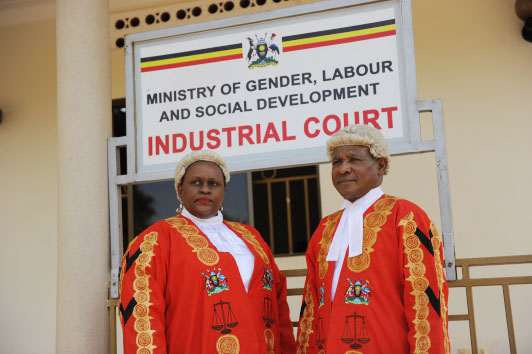
Kampala, Uganda | THE INDEPENDENT | The Industrial Court is considering stopping fixing new cases for hearing because of the huge backlog.
The Chief Judge of the Industrial Court, Justice Asaph Ruhindi Ntenge disclosed this while inaugurating the Industrial Court users committee meeting in Kampala to discuss challenges facing the court.
Despite the fact that he didn’t disclose the exact number of cases in their system, Justice Ruhundi noted that they have already fixed cases for hearing until October, 2020.
He disclosed that whoever needs any hearing date at the moment, will have to wait until October next year.
The Industrial Court is mandated to handle and resolve labor and employment disputes between workers and their employers.
Unlike other courts of judicature, the Industrial Court falls within the ambit of the Ministry of Gender, Labor and Social Development.
The court officials asked the ministry recently to recruit three more judges but the request is to yet to be presented to parliament.
Ruhindi told journalists that if they get the three judges, they can split them into a panel so as to have two court sessions at the same time as opposed to the current situation where they only have a single court session.
He notes that whenever they travel to other parts of the country, business in Kampala comes to a standstill.
The Industrial Court consists of the Chief Judge, the Judge, an Independent Member, a representative of employers and workers. It was operationalized in 2014 under the Labor Disputes (Arbitration and Settlement) Act, 2006.
In March, 2010, Quick Wins Reduction Programme was launched by the Justice Law and Order Sector to clear the case backlog with the long-term objective being to decongest prisons and expedite the adjudication of disputes in the country .
*****
URN
 The Independent Uganda: You get the Truth we Pay the Price
The Independent Uganda: You get the Truth we Pay the Price





